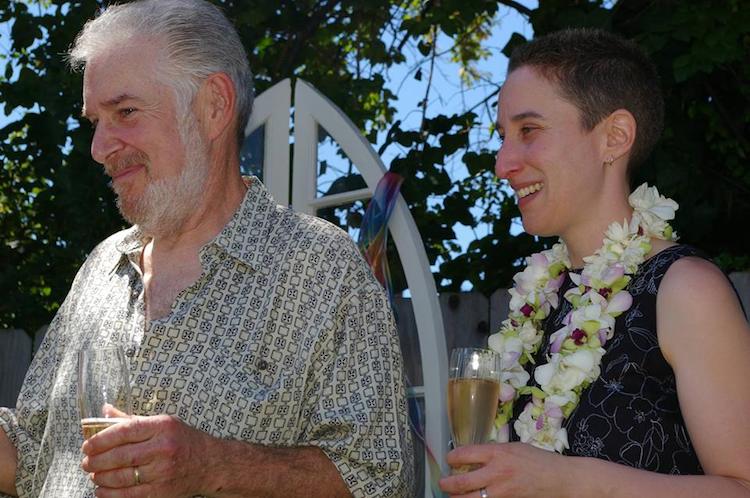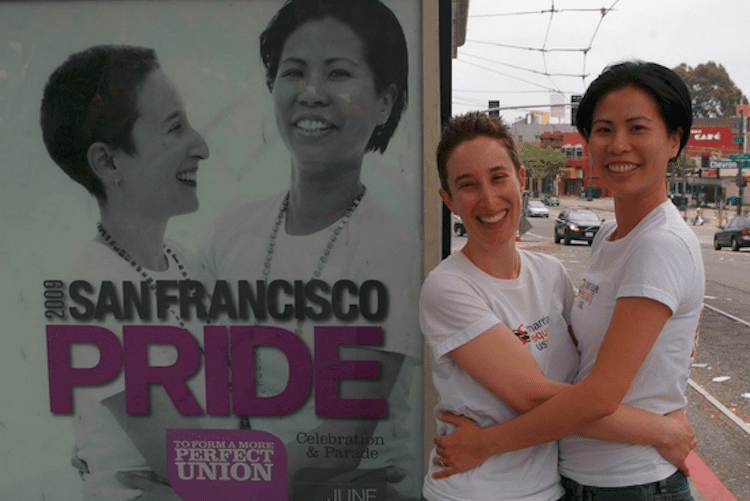
In the summer of 2009, Kirsten Berzon and her wife, Kathy, could be seen embracing everywhere around San Francisco. Larger-than-life pictures of the couple covered the sides of MUNI buses and shelters, reflecting San Francisco Pride’s “To Form A More Perfect Union” theme.
At that time, Berzon was a board member for Marriage Equality USA (MEUSA), an organization that advocated for civil marriage equality in every state and at the federal level. For nine years, she fought for the freedom to marry—until the Supreme Court in 2015 struck down all state bans on same-sex marriage, legalizing it in all fifty states, and requiring states to honor out-of-state same-sex marriage licenses.
We talked to Berzon, associate director of events and experiential learning for the Berkeley MBA for Executives Program, about growing up in Oakland and Berkeley, where her parents owned a well-known local cafe, her history of social justice activism, and weathering turbulent LBGT rights politics.
Where did you grow up?
I was born in Ames, Iowa. My mom was a professor in the English Department at Iowa State University. We moved to Oakland when I was four and a half, so I consider myself a California native.
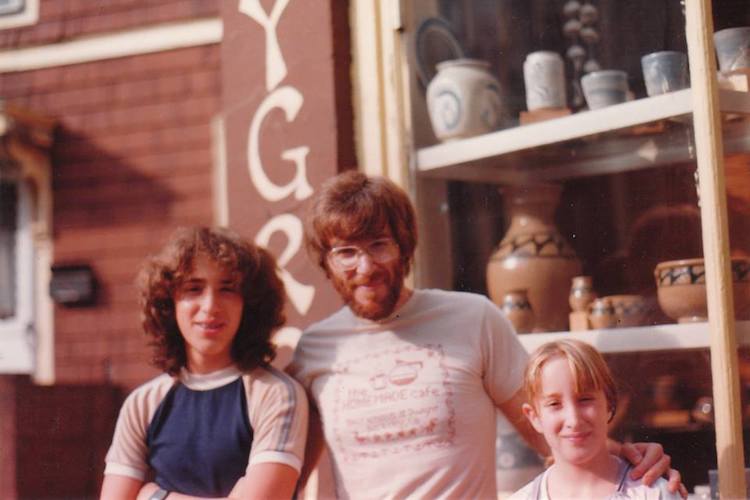
I actually grew up in Oakland and Berkeley, because my parents are divorced, so I spent half the week in each city. In Berkeley our family is a little famous because my parents owned the Homemade Café, a breakfast/lunch greasy spoon. They opened in 1979 and it’s still going strong. They sold it in 2011.
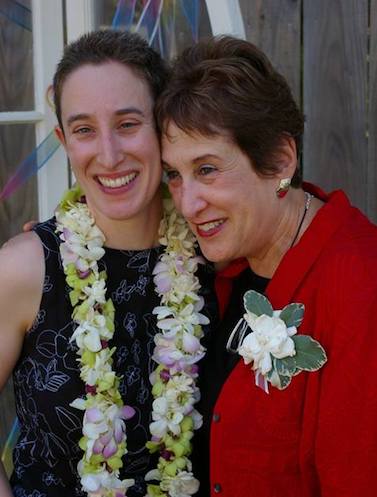
You come from a family of social justice advocates. What was that like?
My dad went to Rutgers University in New Jersey and was the president of the campus chapter of Students for a Democratic Society (SDS), an organization that did a lot of work against the Vietnam War in the ’60s. In addition to SDS, my mom was also heavily involved in the civil rights movement. I think that’s where it started. My whole life, my parents, and my aunt and uncle, my dad’s siblings, were very active, so any topic you can think of—the pro-choice movement, or the war in Iraq, LGBT rights—they’re out there. Since Trump got elected, I think they’re sort of reliving their activist days. I’ve heard my dad say things like, “I thought the ’60s were over. I can’t believe that we’re still fighting for these same issues.”
So how old were you when you came out?
I was 20. It was the summer between my junior and senior year in college. I’d never dated boys, wasn’t even remotely interested except for one sixth grade crush. Also, I didn’t have any interest in girls. When I went away to college, my freshman year I thought, “Okay, I guess I’m supposed to have a boyfriend.” So my roommate and I decided we were going to try and find boys in the dorm to be friends with as a starting point, and we did. And I still didn’t have any romantic interest in them. That kind of went nowhere, but my second year in college I met a woman in the dorm who became my best friend. I also fell in love with her. She was the first lesbian I knew who was my age.
Were there issues when you came out?
It was really hard when I came out to my mom and she said, “Well, you don’t know.” She knew that I was in love with my friend, but she thought that it was a phase, and that it was about that particular person and not about coming to terms with my sexuality.
So how did you finally convince your family?
We got into a lot of discussions and eventually my mom came around, but what I realized is that everyone in the family had to go through their own coming out process. It wasn’t just me. And that was hard to take. It was actually my stepmom, when I came out, who said, “Well, we knew that a long time ago.” And I asked, “Why didn’t you tell me?” While it wasn’t as smooth as I had hoped for, that was a blip on the radar I would say. They are the most loving and supportive family and I am so grateful. My mom and I have marched in the San Francisco Pride Parade multiple times with PFLAG, Parents and Friends of Lesbians & Gays, with people crying and screaming as we went by. It’s such a euphoric feeling.
Can you talk about why you got involved with Marriage Equality USA?
Marriage Equality USA was a very small volunteer driven organization that for many years had little or no paid staff. Our mission was to change hearts and minds by talking to people, one conversation at a time, about why marriage mattered. I believe that is what changed the tide so incredibly quickly on this issue. People realized that all we wanted were the same legal rights that any heterosexual married person had.
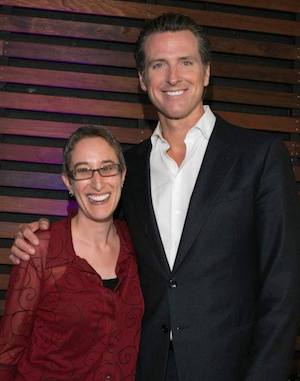
What do you remember about the day that the California Supreme Court granted the rights of marriage to same sex couples?
It was May 15, 2008. I remember that day very clearly. It was a few months before I started working at Haas. I remember sobbing at my computer, overcome with joy, and being totally distracted, thinking, “Oh my God, I’m supposed to be at work.” I read every email and article I could get my hands on and listened to the radio analysis of the decision. I couldn’t understand how the world could keep going like everything was normal, when my life and the lives of so many marriage equality activists like me had changed so dramatically with this victory.
My wife and I got married in August of 2008, along with 18,000 other couples in California, in what became known as the Prop 8 window.
But then Prop 8 passed in November 2008, a ballot measure that eliminated the rights of same sex couples to marry in California. What did you do?
That was a very, very dark time. You felt like you were just trying to live your life and yet there was just so much hate out there. I was working at Haas when Prop 8 passed. Obama had just won his first election, and I was elated. But Prop 8 had passed, and I was destroyed by that. Having those two emotions at the same time was really hard to reconcile.
Considering all that you’ve worked for, including the eventual Supreme Court decision to strike down all same sex marriage bans in 2015, how much does the current political environment worry you?
I’m incredibly nervous. We won marriage, which was huge and what we’d been fighting for for years, but you can still be fired for being gay in 26 states. Brian Silva, the former executive director of Marriage Equality USA, calls it “lived equality.” He’d say, “If you can get married to your same-sex partner on a Sunday, but bring a picture from your wedding into work on Monday and get fired, we have a lot of work left to do.” While we were all incredibly thrilled that we gained the freedom to marry, there are still so many LGBT civil rights battles yet to be won. I’m worried and I don’t think marriage equality is a given anymore. Just like I’m worried about Roe v. Wade, as a former reproductive rights activist. I don’t think either of those hard won rights are safe in the current climate.
